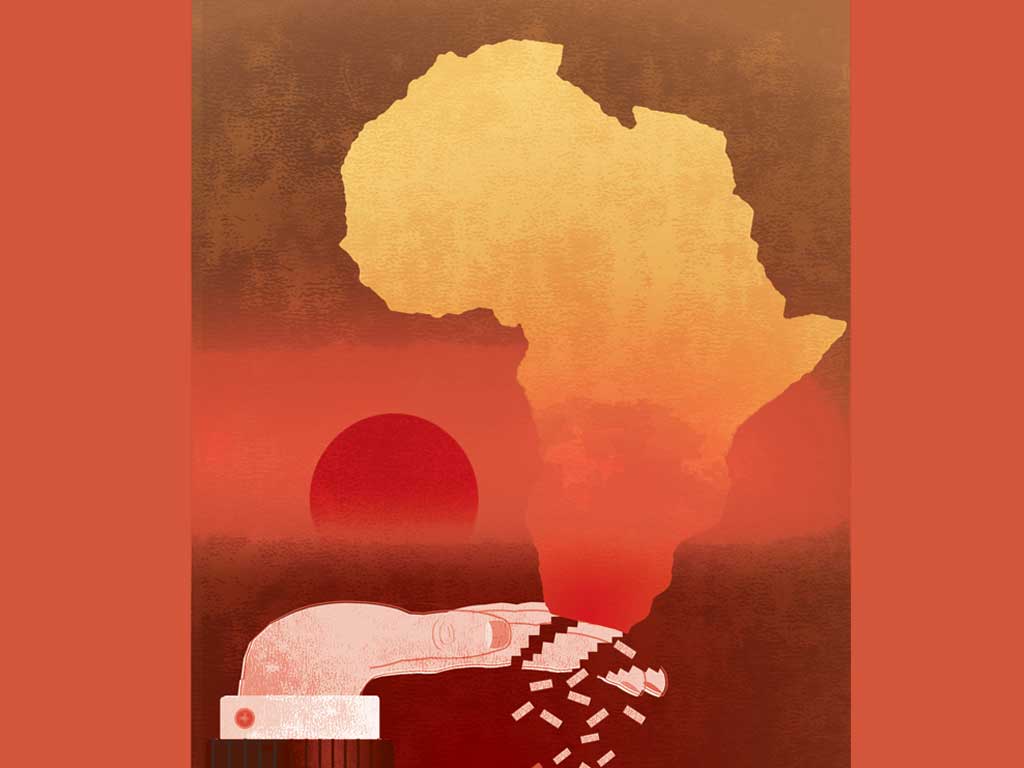Ian Birrell: Bob Geldof's obsession with aid hurt Africa. But now trade is healing the scars
A corrosive culture of aid dependency for 30 years
has portrayed Africa as a helpless supplicant


Your support helps us to tell the story
From reproductive rights to climate change to Big Tech, The Independent is on the ground when the story is developing. Whether it's investigating the financials of Elon Musk's pro-Trump PAC or producing our latest documentary, 'The A Word', which shines a light on the American women fighting for reproductive rights, we know how important it is to parse out the facts from the messaging.
At such a critical moment in US history, we need reporters on the ground. Your donation allows us to keep sending journalists to speak to both sides of the story.
The Independent is trusted by Americans across the entire political spectrum. And unlike many other quality news outlets, we choose not to lock Americans out of our reporting and analysis with paywalls. We believe quality journalism should be available to everyone, paid for by those who can afford it.
Your support makes all the difference.I first became aware of Bob Geldof in 1977 when I bought the debut single by The Boomtown Rats. In those days, he was pretending to be a punk. Since then, he has been an activist, actor, champion of fathers' rights, DJ and multi-millionaire media mogul. Now in his latest guise he is, to use his own vernacular, a private equity whore.
Some might have qualms about this secular saint joining an industry under attack by everyone from the President of the United States to street protest groups. Others might feel he is cashing in on his status as self-appointed saviour of Africa by chairing a fund seeking to invest $450m on the continent. But not me. And not just because that first hit was called "Looking After No. 1".
Although Geldof is no fan of the church, I am reminded of the biblical quotation that there is more joy over one sinner repenting than all those righteous souls in no need of repentance. We can rejoice at his realisation the future of Africa depends on trade, not his myopic obsession with aid. It is just a shame that this comes after three decades in which so much harm has been caused by promoting a corrosive culture of aid dependency and portraying Africa as a helpless supplicant, devastating its image.
It is unfortunate for Geldof this news follows stories revealing his avoidance of tax, rather tarnishing his own image. His British homes were found to be registered in offshore companies, a popular measure with the super-rich costing the hard-pressed British exchequer £1bn a year. And his non-domicile status ensures he avoids paying tax on any overseas earnings, which must be nice.
It does seem rather hypocritical to nag a nation to hand over vast sums to charity when you are not paying the full whack – especially when stashing assets in the same tax havens that foster corruption and undermine development. Clearly paying all your taxes in the UK is for the little people, since his fellow aid apostle Bono played similar games when he moved his band's business away from Ireland.
But we should welcome Geldof's recognition that much of Africa is thriving, thanks to its own energy and enterprise. The twin motors of capitalism and consumerism are driving deep change for the better, reflected in a deluge of heartening statistics. The financial figures are trotted out so often they are becoming almost boring: seven of the world's 10 fastest-growing economies, 13 countries with a higher per capita GDP than China, a fast-emerging middle-class with higher household spending than India.
Unfortunately, such truths have been obscured by the Live Aid legacy. For all their fine intentions, the mega-concerts proved a disaster for Africa. The tone was set by the absence of African artists from the line-ups of bands playing at concerts designed to save their continent. The message was clear: it was western voices that counted.
In their wake came the unleashing of an aid boom that scars the world with simplistic, self-serving "solutions". Two decades ago there were thought to be 70 charities operating in Ethiopia; today, the figure is close to 5,000. In Kenya, there is a slum with an estimated one charity for every 32 people living there. After any major disaster, where once 40 groups operated, there will now be in excess of 1,000, causing chaos and confusion rather than helping the afflicted, as seen following the Haitian earthquake two years ago.
Western politicians of all hues, desperate to look sensitive and caring, cravenly pandered to this aid lobby led by Bob and Bono, while journalists put on kid gloves when engaging with it, ignoring practices that would provoke outrage elsewhere. As a result, global aid spending soared from £50bn a year to £83bn over the first decade of this century; today 595,000 people work in a fiercely-competitive industry.
A study last year found even among these aid workers only about one-third thought their projects worked. In private, many will admit to grave doubts. You could fill this entire newspaper with examples of how the flood of money washes down the drain: a report by two health economists, for example, found nearly two-thirds of health aid in Africa is diverted. The waste, the ineptitude, the tolerance of corruption, the support for repression, the furthering of inequality, the boosting of arms spending is utterly scandalous.
But consider just two aspects of this boom. First, all those new colonialists riding around in their big white jeeps telling the locals what is good for them. "They don't consult with us," complained a minister in Somalia, latest recipient of massive British aid. "It's like a doctor trying to prescribe medicine for a patient you haven't seen yet."
This distorts priorities of recipient nations. It leads to the creation of pointless bureaucracy – one study found a typical African country must churn out 10,000 aid reports each year. Additionally, while our government attacks welfare dependency at home, it encourages it abroad with unquestioning support for politicians who have no need to bother responding to the needs of their own citizens.
Imagine how we would feel if armies of Africans came and told us how to run our schools and hospitals (while living in some of the smartest homes)? Or funded politicians who steal and murder? But this is our approach abroad: we know best, our voices count. This is how Britain ended up funding a regime that sent a hit squad to this country to kill people. And how it spent £1bn supporting education in just three east African countries but failed to check whether the teachers turned up or the children were learning; sadly, they were not.
Second, there is strong competition from all those charities for your money. They produce adverts and leaflets to tug your conscience, making it seem like the Four Horseman of the Apocalypse – war, poverty, starvation, disease – gallop constantly across Africa. If you are not negative enough, you won't get the funding," confessed one charity boss.
A study suggested the dominant image remains "malnutrition and pot-bellied young children desperate for help with flies on their faces". The result of all this poverty porn – especially combined with a similar and lazy media narrative – is that Westerners see the continent as one benighted and dangerous country, not a vibrant, inventive and increasingly-successful collection of 54 diverse nations. This constant negative imagery puts them off travelling or trading there.
Despite these dreadful legacies of Live Aid, Geldof is a man of admirable energy and tenacity. No doubt his new group's investments in firms, farms and factories will pay off for both him and Africa. At last, his efforts for the continent deserve real applause.
Join our commenting forum
Join thought-provoking conversations, follow other Independent readers and see their replies
Comments